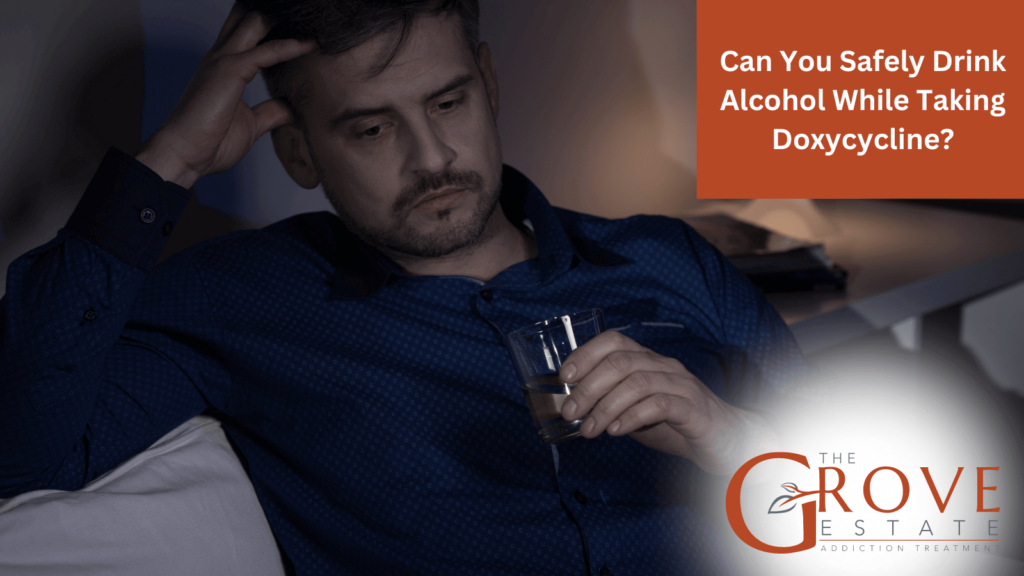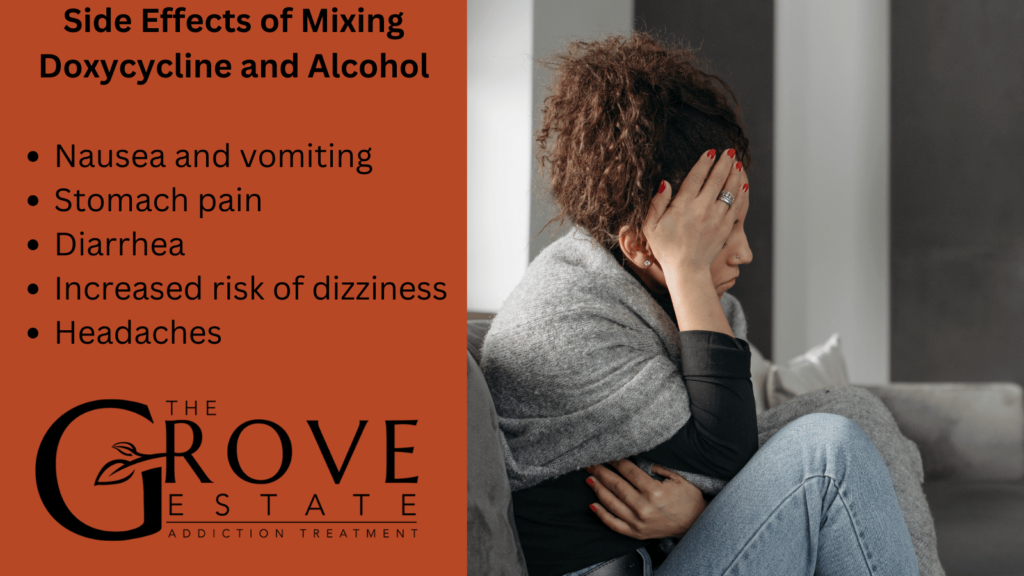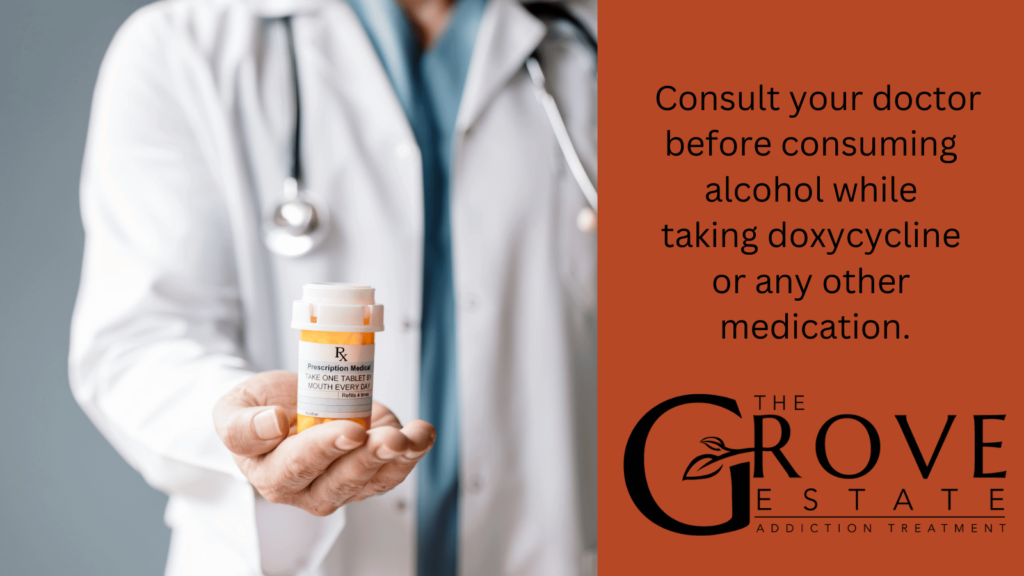Doxycycline is a commonly prescribed antibiotic used to treat a variety of bacterial infections, from acne to pneumonia. As with many medications, patients often wonder about the safety of consuming alcohol during treatment. While doxycycline and alcohol do not have a known severe interaction, combining them can raise concerns. According to the National Institute on Alcohol Abuse and Alcoholism (NIAAA), in 2019, 54.9% of people over the age of 18 reported they had consumed alcohol in the past month.
Alcohol can potentially diminish the effectiveness of the antibiotic and increase the risk of side effects, such as nausea and dizziness. Moreover, since both substances are processed by the liver, drinking alcohol while taking doxycycline can put additional stress on this organ. This introductory discussion will delve into the intricacies of mixing alcohol with doxycycline, exploring the medical community’s perspective, potential risks, and the importance of informed decision-making for individuals on this medication.

Can You Safely Drink Alcohol While Taking Doxycycline?
It’s highly advisable to avoid alcohol consumption while taking doxycycline or any antibiotics. Alcohol can impair the body’s immune response, which is crucial for fighting infections, and can interfere with the metabolism and effectiveness of the medication. Specifically, alcohol can alter the way the liver processes doxycycline, potentially leading to reduced absorption and efficacy of the antibiotic, thereby prolonging the duration of the infection or disease.
The interaction between doxycycline and alcohol can exacerbate side effects such as nausea, vomiting, diarrhea, and stomach upset, making it more difficult for the body to tolerate the antibiotic. In some cases, alcohol can also increase the risk of doxycycline-induced liver toxicity, which, although rare, is a serious concern.
In addition to these physical health risks, consuming alcohol while on doxycycline can also impact the overall treatment outcome. It may lead to a longer recovery time from the infection, increased likelihood of antibiotic resistance, and a greater chance of complications related to the infection. Therefore, to ensure the best possible effectiveness of doxycycline and to minimize health risks and side effects, it is best to avoid alcohol during the antibiotic course. This approach supports the body’s healing process and helps in achieving a full and swift recovery.
What is the Interaction Between Doxycycline and Alcohol?
Doxycycline works by inhibiting protein synthesis in bacteria, thereby stopping their growth and reproduction. Alcohol, on the other hand, is metabolized in the liver and can affect various bodily functions. The interaction between doxycycline and alcohol is not fully understood in terms of direct chemical interference, but the concern lies in the potential effects of alcohol on the body’s ability to utilize the antibiotic effectively.
When mixed, alcohol does not directly negate the antibiotic’s effectiveness, but it can influence the body’s environment, making it harder for the antibiotic to perform its function. For example, alcohol can depress the immune system, slow down the healing process, and exacerbate the side effects of doxycycline, such as stomach upset and dizziness.
Chemically, alcohol and doxycycline do not have a known direct interaction that would render the antibiotic ineffective. However, excessive alcohol consumption can lead to liver damage, and since the liver is responsible for metabolizing both substances, this can potentially affect the breakdown and efficacy of doxycycline.

What are the Side Effects of Mixing Doxycycline and Alcohol?
Mixing doxycycline and alcohol can lead to increased side effects and discomfort. Common side effects include nausea, vomiting, stomach pain, and diarrhea. Alcohol can exacerbate these gastrointestinal symptoms, making them more severe and uncomfortable. Here are some of the common side effects and risks:
- Nausea and vomiting
- Stomach pain
- Diarrhea
- Increased risk of dizziness and headaches
In more serious cases, heavy or chronic alcohol consumption while taking doxycycline can lead to liver complications. Both alcohol and doxycycline are metabolized by the liver, and overloading the liver with both substances can strain it, potentially leading to liver damage or exacerbating pre-existing liver conditions. Here are some other serious health complications of taking doxycycline while drinking alcohol:
- Potential for liver complications, especially with heavy or chronic alcohol consumption
- Possible exacerbation of pre-existing liver conditions
- Impaired immune system function, potentially reducing the effectiveness of doxycycline
- Prolonged recovery time for the treated infection
How Alcohol Can Affect the Efficacy of Doxycycline?
Alcohol can affect the efficacy of doxycycline in several ways. It may interfere with the absorption of the antibiotic in the digestive system, potentially reducing its concentration in the bloodstream and diminishing its overall effectiveness against bacterial infections. Additionally, alcohol can impair liver function, which is crucial for metabolizing doxycycline, possibly leading to altered levels of the medication in the body.
Since alcohol has immunosuppressive effects, it can weaken the body’s immune response to the infection, making it harder for the body to fight off the bacteria even with the aid of antibiotics. Consequently, consuming alcohol while taking doxycycline might not only reduce the drug’s effectiveness but also prolong the duration of the infection and recovery time.
How Long After Taking Doxycycline Can You Drink Alcohol?
The recommended waiting period before consuming alcohol after taking doxycycline can vary based on individual health factors and the specifics of the antibiotic course. Generally, it is advised to wait at least 48 hours after completing the doxycycline course before drinking alcohol. This time frame allows the antibiotic to be sufficiently metabolized and cleared from the body, reducing the risk of interaction and side effects.
Several factors can influence this waiting period, including the individual’s metabolism rate, liver health, the severity of the infection being treated, and the dosage and length of the doxycycline course. Individuals with compromised liver function or those who have been on a long-term antibiotic treatment may need to wait longer before safely consuming alcohol. It is crucial to follow the guidance of a healthcare provider, who can consider these factors and recommend a safe waiting period based on the patient’s specific health profile and treatment details.

How Does Consuming Alcohol Compare when Taking Doxycycline vs. Amoxicillin?
When comparing the consumption of alcohol while taking doxycycline versus amoxicillin, there are subtle differences in how alcohol interacts with each antibiotic. For doxycycline, although there is no direct severe interaction with alcohol, its effectiveness can be compromised as alcohol may interfere with the antibiotic’s absorption and exacerbate side effects like nausea and vomiting. Additionally, alcohol can impair the immune system, potentially weakening the body’s response to the infection.
On the other hand, amoxicillin, while also not having a direct harmful interaction with alcohol, may see a similar increase in side effects such as stomach upset and dizziness when alcohol is consumed. However, the metabolism and absorption of amoxicillin are less likely to be impacted by alcohol compared to doxycycline. Despite these differences, the general medical advice for both antibiotics is to avoid or limit alcohol consumption during treatment to ensure the medications can work effectively and to reduce the risk of side effects and prolonged recovery from infection.
Which antibiotic can you not drink alcohol with?
You should not drink alcohol with all antibiotics as it can cause severe reactions including nausea, flushing, and rapid heartbeat.
Is Doxycycline stronger than Amoxicillin?
Doxycycline and amoxicillin have different strengths and are used for different types of infections; one is not universally stronger than the other.
Can you have 2 drinks on Doxycycline?
It is not recommended to have any alcohol while taking doxycycline as alcohol can reduce the effectiveness of the medication and increase the risk of side effects.
What happens if you drink alcohol while taking Metronidazole?
Drinking alcohol while taking metronidazole can cause a severe reaction, including nausea, vomiting, flushing, headache, and rapid heartbeat, known as the disulfiram-like reaction. It is strongly advised to avoid alcohol during treatment with metronidazole and for at least 48 hours after completing the course.
How does alcohol impact antibiotic resistance when taking doxycycline?
The misuse of antibiotics, including doxycycline, combined with unhealthy lifestyle choices like excessive alcohol consumption, can contribute to antibiotic resistance, a significant global health concern. According to health experts, alcohol does not directly cause antibiotic resistance; however, it can impair the body’s immune response and interfere with the effectiveness of antibiotics. This reduced efficacy might lead to incomplete treatment of infections, giving bacteria a chance to mutate and develop resistance to antibiotics.
Addressing antibiotic resistance requires a multifaceted approach, including patient education on the importance of following prescription guidelines and lifestyle choices that support health and wellness. Resources on alcohol with antibiotics provide valuable information on how combining alcohol with antibiotics like doxycycline can affect treatment outcomes and contribute to broader issues like antibiotic resistance, emphasizing the need for informed decisions about alcohol consumption during antibiotic treatment.
What are the dietary considerations while taking doxycycline?
While taking doxycycline, dietary considerations can play a crucial role in maximizing the medication’s effectiveness and minimizing side effects. It’s important to stay hydrated and maintain a balanced diet to support the body’s healing process. Some foods and supplements, particularly dairy products, can interfere with doxycycline’s absorption, reducing its efficacy. Patients are advised to avoid or limit intake of calcium-rich foods and supplements shortly before and after taking the medication.
Incorporating a holistic approach to health, including exercise and nutrition during antibiotic treatment, can enhance the body’s response to medication and support overall well-being. Such programs offer tailored guidance on creating a diet plan that complements medical treatment, ensuring that patients receive the full benefits of their prescribed antibiotics while maintaining their health and vitality.

Share This Post



